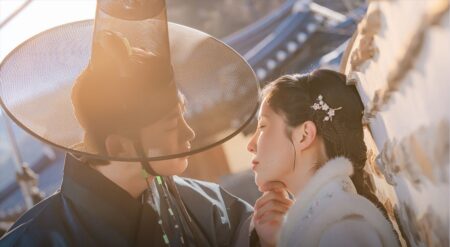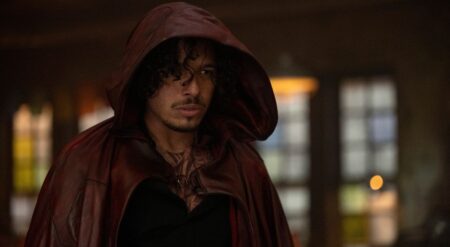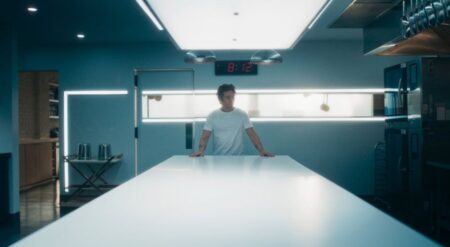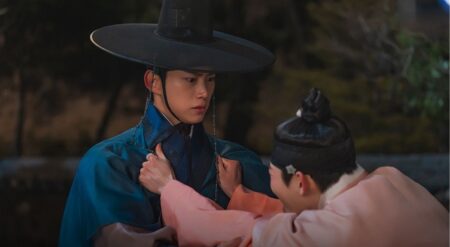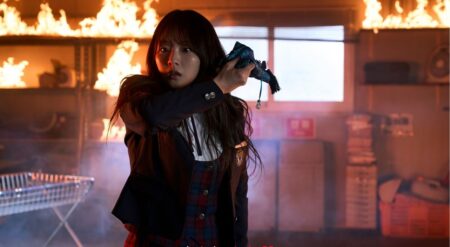
Red Rose is a British horror/thriller series originally shown on BBC Three but also available on Netflix. The show is created by Michael Clarkson and Paul Clarkson and has a cast that includes Isis Hainsworth, Amelia Clarkson, Ellis Howard, and Ashna Rabheru. A group of teenagers in Bolton, England, have their lives tormented as soon as one of them downloads an app called Red Rose.
This is a show with a story that is ever-changing, but hard to get through. From the first scene, the subject matter is something heavy and it creates an unnerving atmosphere. It follows a group of friends right after summer exams, filled with the insecurities that age entails. But once the Red Rose app is installed, those insecurities are at the forefront. The whole series is led at a pace that can make it a struggle to sit through, very slow in its progression. But it is also filled with intense anxiety that can be felt constantly. It comes in multiple forms, but the enemy is something that is so unpredictable and unknown. The storytelling is great at misdirection, leading me to think of the wildest and most abstract directions. The implementation in the first few episodes brings up possible supernatural or sci-fi elements, always powering up a conspiracy. It’s a story that shatters trust.
The story has a devastating twist early on that changes the characters and the narrative completely, denoting ruthlessness from the creators. The plot is always delving into the various aspects of young lives that generate stress, amplifying it through shame. Red Rose uses manipulation and isolation to drive those that use it into severe darkness and danger. It is a heavy show, unafraid to use suicide and other themes in order to drive the story. Technology is an important, menacing theme in the plot, but it is approached with nuance to be extremely terrifying. Someone’s life and personality being available to monitor simply through their phone is a horrifying possibility in this series.
The story becomes clearer later, still rife with mysteries but with a more driven sense of what is happening. But the tension is still intoxicating, with many false endings that seek to create small glimmers of hope before the drama returns. The final reveal doesn’t wrap up all the loose ends in my view and left me feeling incomplete. Not for the character arcs, that is concluded well, but there are hints at something beyond just this series and it depletes the small scale and intimacy that had been generated.
Red Rose has a big cast, carried by a group of young actors. It leans on a grounded edge to the characters similar to what Skins did, set in the working-class town of Bolton. In the beginning, there is Rochelle. She’s loud but loyal, with a gang of mates giving themselves the name “Dickheads”. Hainsworth is a great performer, superbly showing a rapid shift in personality and mindset that can be caused by isolation. Whilst she is the foundation of the series, the others in that group are terrific too. Especially Wren (Clarkson), Rochelle’s best friend, who is given just as much torment as her best friend. The straining of that relationship forms the core of what to expect. Some of the other actors in that group take time to shine, all having their own problems, but they get their moment.
And the series does a great job of acknowledging how teenagers speak in the area without feeling patronising or scripted by older writers that don’t actually know how young people talk. But there are many moments where the dialogue appears unnatural, there purely to hammer a point home or to tell story than to sound like authentic conversations. There are numerous times when a solution could very easily be found, but is ignored to ramp up the tension. But that is to be expected when an enemy is twisting things and the characters are too stressed to know what the right thing to do is.

I particularly love the portrayal of the adults in this series, as the sense of community is captured beautifully and tragically. Many of the parents of the kids have known each other for years, growing up together themselves. So when awful things happen, the ripple effect tears through the small town. The writers of Red Rose can tap into agonising pain, begrudging hopelessness, but at the same time perseverance. Samuel Anderson, playing Rochelle’s father, is a stunning example of that emotional performance. I found the adults’ general welcoming of their children’s friends into their homes, chipping in, is reflective of real life in communities such as that. But it’s a set of bonds that can be targeted and strained.
The darkness and the creepiness of the show are presented through the visuals. There is a dark, naturalised look to the series, accessing the grittiness that British teen dramas often reach for. The camera work can shift in its scale on a whim. It can stay agonisingly close, obscuring what we might want to see. Alternately, the shots can go very wide, increasing that horrible feeling that the characters are always being observed. Red Rose is modern, with advanced technology playing a huge role in the application of the story. But the cinematography appreciates older buildings. It’s not a modern-looking picture. The editing is part of what makes the pace straining sometimes, with long scenes that don’t like to cut away. The sound design is influential to the tone. There is contemporary music used by the young cast, but silence is thrown in too. In contrast, echoing and crowded voices can magnify the claustrophobia of certain scenes, and the dinging and buzzing of phones become nightmare fuel.
Red Rose has created anxiety that is almost overpowering. It’s a difficult show because you can’t settle into it, with the characters and the subject matter leaving me permanently on edge. The dialogue can be clunky yet beautiful when it matters, but the story is very captivating. It might stick the landing, but the heaviness and suffocation I felt whilst watching made it an unforgettable experience. It’s not for everyone and could be potentially triggering, but I also found that there were enough snippets of love within the darkness to keep me going. As a show, it harks back to the gritty and grounded teen dramas that BBC Three used to create.
Red Rose is available on Netflix and BBC iPlayer in the UK.
Red Rose
-
Rating - 7/107/10
TL;DR
Red Rose has created anxiety that is almost overpowering. It’s a difficult show because you can’t settle into it, with the characters and the subject matter leaving me permanently on edge.

